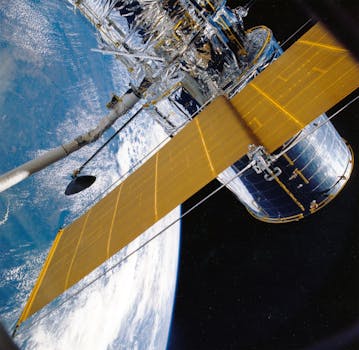The Future of Satellites: Revolutionizing Global Communication and Exploration

The Future of Satellites: Revolutionizing Global Communication and Exploration
The future of satellites holds tremendous promise for revolutionizing global communication, exploration, and our understanding of the universe. With advancements in technology and decreasing costs, satellites are becoming increasingly accessible and versatile. At the beginning of the Future of satellites era, the concept of space exploration and communication was considered the realm of science fiction. However, with the launch of the first artificial satellite, Sputnik, in 1957, the world witnessed the dawn of a new era in space technology.
One of the primary drivers of the future of satellites is the increasing demand for global communication and connectivity. As the world becomes more interconnected, the need for reliable and efficient communication systems has never been more pressing. Satellites play a crucial role in providing internet access to remote and underserved communities, enabling global communication, and facilitating the exchange of information. The development of new satellite constellations, such as OneWeb and Starlink, is expected to further bridge the digital divide and provide high-speed internet access to millions of people around the world.
Another significant aspect of the future of satellites is the advancement of space exploration. With the help of satellites, scientists can study the universe in unprecedented detail, gaining insights into the formation and evolution of stars, galaxies, and planets. Satellites have also enabled the discovery of new planets and celestial bodies, expanding our understanding of the cosmos. The future of satellites holds great promise for deep space exploration, with missions like the James Webb Space Telescope and the Square Kilometre Array (SKA) set to revolutionize our understanding of the universe.
The future of satellites also holds great promise for Earth observation and environmental monitoring. Satellites can provide critical information about climate change, deforestation, and natural disasters, enabling policymakers and scientists to make informed decisions about the management of our planet’s resources. The development of new satellite technologies, such as synthetic aperture radar (SAR) and hyperspectral imaging, is expected to further enhance our ability to monitor the Earth’s environment and respond to natural disasters.
In conclusion, the future of satellites is a rapidly evolving field that holds tremendous promise for revolutionizing global communication, exploration, and our understanding of the universe. As technology continues to advance and costs decrease, satellites are becoming increasingly accessible and versatile, enabling new applications and opportunities for scientific discovery and exploration. As we look to the future, it is clear that satellites will play an increasingly important role in shaping our understanding of the world and the universe.







